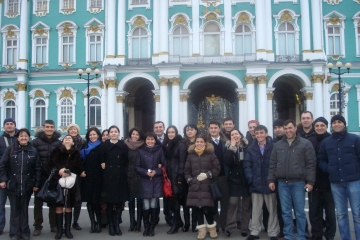The issue of economic exclusion is a stark one: the number of unemployed youth globally is estimated at 71 million, with many regions recording a youth unemployment rate twice as high as adults. Of the youth worldwide who are working, 16% of these 15 to 24-year olds fall into the category of “working poor.” Over 40 percent of women remain outside of the formal financial system.
The Aga Khan Foundation (AKF) therefore aims to improve the economic well-being of women and men, particularly youth. Because small- and medium-sized enterprises (SMEs) generate 50 percent of employment worldwide, AKF is focused on increasing employment and self-employment, increasing productivity and income from producers and businesses, and enhancing access to affordable and useful financial products. AKF is also focused on increasing access to renewable energy, as 1.4 billion of the world’s people have no access to electricity, a prerequisite to business development. Much of this work is being done through Accelerate Prosperity - a new global initiative of the Aga Khan Development Network (AKDN) in Central and South Asia.
Programme highlights 1: Accelerate Prosperity has incubated or accelerated over 650 businesses.
Programme highlights 2: Accelerate Prosperity has matched financing for 121 businesses worth over $2 million USD, creating 580 new jobs.
Accelerate Prosperity
Accelerate Prosperity, a joint venture by AKF and AKFED, promotes entrepreneurship with an emphasis on women and youth, and the growth of small and growing businesses. This includes structured training, networking, tailored technical assistance and patient growth financing. Start-up activities emphasise lean business model iteration and revenue generation. Through a competitive process, the most promising entrepreneurs are offered investment-readiness support with mentorship, access to early stage financing and Accelerate Prosperity’s own risk-tolerant capital. Supported companies create new jobs and contribute to inclusive economic development.
Market systems development
AKF seeks to enhance productivity and market integration for thousands of producers in rural areas each year. AKF supports value chain development in high priority sectors, producer-group and cooperative development, lead firm engagement, out-grower schemes, business corridor or cluster promotion, cross border market development and business enabling environment initiatives. AKF works with producers to enhance quality and nutritional value of foods and supports nutrition-related businesses.
Programme highlights 1: In 2018, in Afghanistan, 75% of the 9,000 youth, mostly women, who have graduated from AKF-supported employment programmes have secured employment.
Programme highlights 2: In 2018, in India, 70% of the 35,000 disadvantaged rural youth who accessed AKF-supported job and apprenticeship training programmes have secured employment.
Skills development
AKF promotes access to market-oriented skills in vocational and technical trades through direct provision of training as well as through facilitating access to services provided by AKDN agencies and public/private service providers. AKF also strengthens the capacity of existing service providers and technical and vocational education training institutes. AKF will test, catalyse and scale up approaches that prepare youth for the future of work, which is increasingly shaped by information, communication technologies and other technologies.
Employment services
AKF supports the transition from training to employment through apprenticeships, career counselling and internships. This includes employer engagement to identify job opportunities; and incentives to recruit the graduates of AKF’s skills development programmes. As part of a broader emphasis on the future of work, AKF plans to mobilise coalitions of large employers through business and social incentives to train and recruit youth. AKF also focuses on catalysing impact sourcing from global and local businesses to generate work for disadvantaged young women and men in rural and semi-rural settings.
Programme highlights 1: In 2019, AKF’s clean-energy interventions benefitted over 51,000 people worldwide annually, including 25,000 in Gilgit-Baltistan, Pakistan.
Programme highlights 2: AKF’s clean-energy interventions have benefitted approximately 76,000 people worldwide over the last two years—most of whom reside in off-grid communities in India, Pakistan, Syria and Tajikistan.
Community-based energy solutions
AKF supports small-scale community-based energy generation solutions, to provide access to clean energy for domestic and commercial uses such as off-grid micro-hydel projects under one megawatt. These energy units are typically owned and managed by the community and complement larger-scale AKDN energy initiatives by extending coverage of electricity to underserved and remote areas. AKF is exploring energy technologies beyond hydroelectricity, including solar solutions linked to key economic sectors such as agriculture.
Innovative energy business models
Building on the experience of small-scale community-managed energy projects, AKF tests new business models and approaches to increase the efficiency, management and financial viability of relatively larger energy projects. This includes transforming up to one megawatt capacity generation units into community and private utilities, deploying blended capital, and testing contextually relevant digital pre-payment solutions. AKF works closely with Pamir Energy to address energy needs in areas where AKF’s traditional micro-hydel activities are not available or where new energy solutions are required.
Programme highlights 1: AKF supports 7,000 saving groups worldwide.
Programme highlights 2: AKF’s efforts reach more than 400,000 members of community-based savings groups.
Community-based savings groups (CBSG)
Cash-based savings groups are time-tested, widely applicable and consistently demanded primarily women as a safe and convenient means to save regularly toward emergencies and investments. AKF seeks to enhance productivity and market integration for thousands of producers in rural areas each year. AKF supports value chain development in high priority sectors, producer-group and cooperative development, lead firm engagement, out-grower schemes, business corridor or cluster promotion, cross border market development and business enabling environment initiatives. AKF works with producers to enhance quality and nutritional value of foods and supports nutrition-related businesses.
Community-managed funds
AKF supports communities to establish community-managed funds for agriculture, non-farm investments, as well as for health and education in remote areas where commercial loan capital is unavailable and investments are too large for savings groups to fund. These funds may be time-bound or may evolve into permanent institutions.











